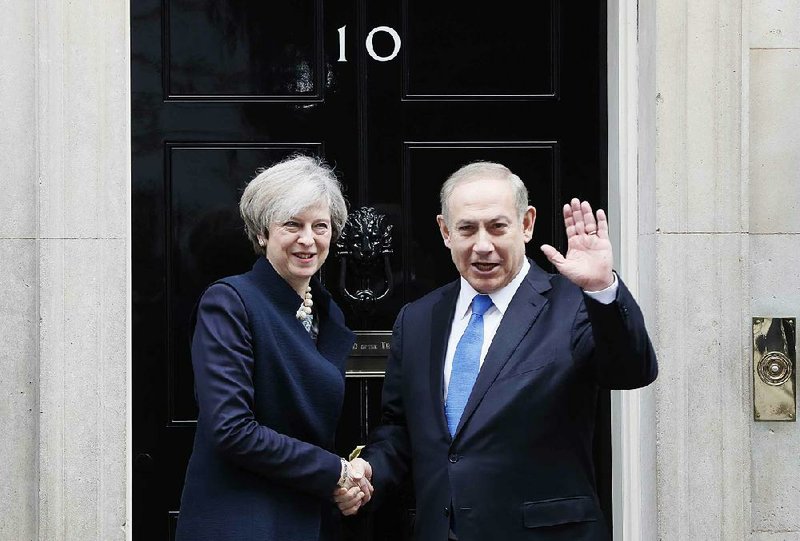LONDON -- Israeli Prime Minister Benjamin Netanyahu on Monday urged British Prime Minister Theresa May to follow the American administration and impose new sanctions on Iran over a recent missile test.
The two leaders met at 10 Downing St. for talks that British officials hoped would focus on boosting trade ties between the two countries once Britain leaves the European Union.
But as photographers captured the start of the meeting, Netanyahu told May: "I'd like to talk to you about how we can ensure that Iran's aggression does not go unanswered."
Netanyahu said he wished other countries would follow the lead of the U.S. and sanction Iran for the missile test. While the test didn't contravene the nuclear accord, critics say it goes against a United Nations Security Council resolution that enshrines the agreement.
[PRESIDENT TRUMP: Timeline, appointments, executive orders + guide to actions in first 100 days]
"Iran seeks to annihilate Israel, it seeks to conquer the Middle East, it threatens Europe, it threatens the West, it threatens the world," he said. "And it offers provocation after provocation.
"That's why I welcome President [Donald] Trump's assistance of new sanctions against Iran. I think other nations should follow suit, certainly responsible nations."
In a statement released hours later by her office, May said she recognized concerns about "Iran's pattern of destabilizing activity in the region" while noting that the 2015 nuclear deal with Iran was "vital" and must be "properly enforced and policed." The Israeli premier has been invited to visit the White House on Feb. 15 and had said his discussions with British leaders would focus on how to work with Trump to confront Iran.
Iran and Israel are bitter enemies. Netanyahu vehemently opposes the 2015 international agreement that imposed curbs on Tehran's nuclear program in exchange for lifting sanctions.
Trump, also a critic of the Iran deal, imposed the sanctions on 25 people and entities the U.S. says are involved in helping Iran develop its ballistic missile program or are in supporting groups that the U.S. considers terrorist, such as Lebanon's Shiite Hezbollah militant group.
The sanctions affect two Chinese companies and three Chinese individuals, and China said Monday that it had lodged a formal protest with the U.S.
The state-run Xinhua news agency said the sanctions cast a shadow over the prospects for a peaceful settlement of the Iranian nuclear issue and called them a "ticking time bomb" for peace and stability in the entire Middle East.
"We have consistently opposed any unilateral sanctions," Chinese foreign ministry spokesman Lu Kang told a regular news conference. "The sanctions will not help in enhancing trust among the different parties involved and will not help in resolving international problems."
But China's concerns about the new Trump administration appear to have been somewhat calmed by comments regarding the South China Sea made by Defense Secretary Jim Mattis.
After other Trump administration officials hinted at the possibility of a naval blockade of China's artificial islands, Mattis called for diplomatic efforts to resolve the dispute and played down the need for U.S. military maneuvers in the contested sea.
Mattis' comments, during a tour of Japan and South Korea last week, were a "mind-soothing pill" that had "dispersed the clouds of war that many feared were gathering over the South China Sea," the official English-language China Daily newspaper said in an editorial Monday.
"Mattis has inspired optimism here that things may not be as bad as previously portrayed," the newspaper said.
While warning that the U.S. stance toward South Korea and Japan could jeopardize regional security, Lu said the remarks about the South China Sea were "worthy of affirmation."
And Iran's foreign ministry spokesman, Bahram Qasemi, insisted that Iran did not conduct the missile launch to test the new White House.
"Iran's missile test was not a message to the new U.S. government," he was quoted as saying by the Tasnim news agency. "There is no need to test Mr. Trump as we have heard his views on different issues in recent days. ... We know him quite well."
Information for this article was contributed by Jill Lawless of The Associated Press; by Jonathan Ferziger, Alex Morales and Robert Hutton of Bloomberg News; and by Simon Denyer, Congcong Zhang and Brian Murphy of The Washington Post.
A Section on 02/07/2017
